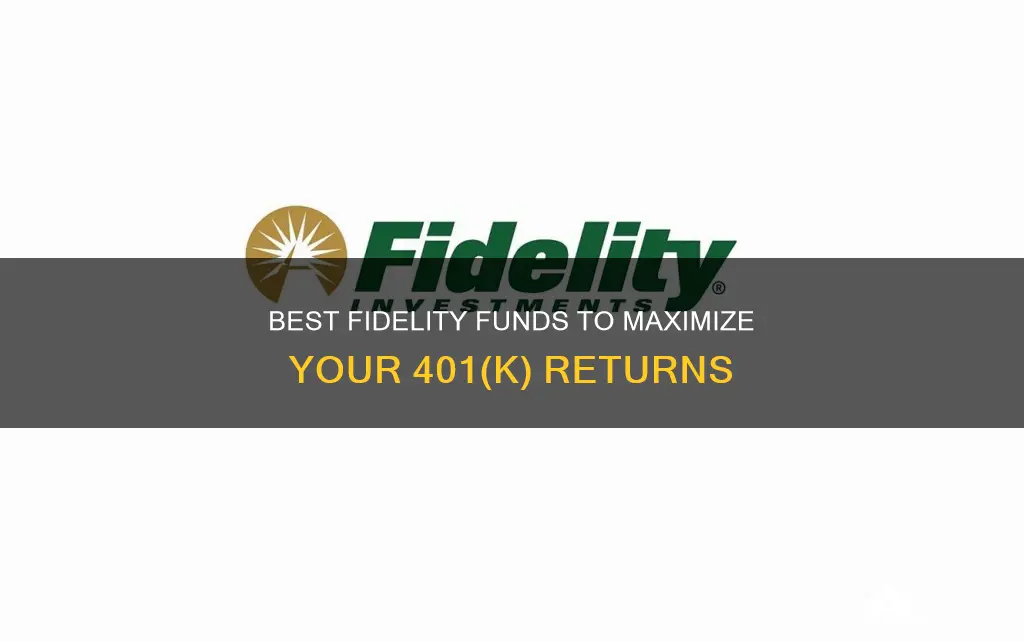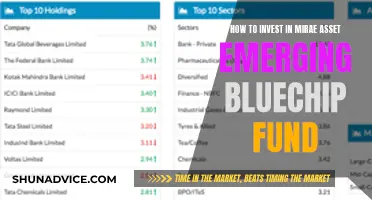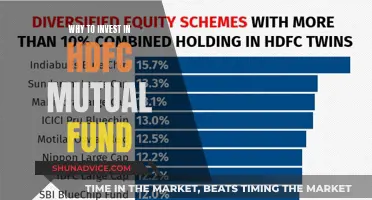
When it comes to investing in a 401(k), there are a variety of options to choose from. Fidelity, a well-known investment firm, offers a range of funds that can be used for retirement savings. These include actively managed funds, index funds, and target-date funds. Actively managed funds, such as the Fidelity Blue Chip Growth Fund, have portfolio managers who aim to beat the market by carefully selecting stocks. Index funds, on the other hand, aim to replicate the performance of a specific market index, like the S&P 500. Target-date funds are designed for people retiring around a specific year and adjust their asset allocation accordingly. When choosing which funds to invest in, it's important to consider factors such as fees, past performance, and the level of risk involved.

Target date funds
Each target date fund invests in a mix of investments appropriate for that time frame. As the target date nears, the fund's asset allocation will gradually shift to become more conservative, usually by reducing the level of stock investments and increasing investments in bonds. This means you don't need to adjust your asset allocation over time or worry about rebalancing your portfolio—Fidelity's investment team will handle all of that for you.
Fidelity Freedom Funds are an excellent choice for target date investing. With a nearly 30-year track record, Fidelity has been a pioneer in target date investing since 1996 and is deeply committed to providing exceptional value to its target date clients. Fidelity offers a range of target date funds, including the Fidelity Freedom® 2055 Fund, to meet the varying needs of investors.
When choosing a target date fund, it's important to remember that each provider's strategy is unique. Factors such as investment attributes, design, portfolio construction, fees, and expenses can significantly impact the performance and risk of an individual target date portfolio. It's also crucial to understand the risks involved, as no target date fund guarantees sufficient retirement income, and the share price can fluctuate, resulting in potential losses.
Overall, target date funds like those offered by Fidelity provide a hassle-free way to invest for retirement by offering a diversified portfolio that automatically becomes more conservative as the target date approaches.
Debt Funds: Where Does Your Money Go?
You may want to see also

Asset allocation funds
Fidelity offers a range of Asset Manager funds, with equity exposure ranging from conservative (20%) to aggressive growth (85%). The specific fund chosen depends on the investor's risk tolerance, time horizon, and investment goals. For example, an investor with a shorter time horizon or lower risk tolerance may opt for the Fidelity Asset Manager 20%, while an investor with a longer time horizon and higher risk tolerance may choose the Fidelity Asset Manager 85%.
Fidelity has over 25 years of experience managing asset allocation strategies and is committed to research and careful adherence to strategic goals and principles. Their asset allocation funds are designed to provide modest growth and below-average risk, dynamically shifting to reduce risk as the investor gets closer to their horizon date.
Closed-End Investment Funds: Where and How to Trade
You may want to see also

Managed accounts
Digital Investment Management and Advice
Once you work with Fidelity online to choose an investment strategy, you can explore their online planning resources to get clear next steps and track your progress.
Digital Investing Plus Access to Coaching
This option provides professional, affordable money management with automatic rebalancing to keep your strategy on track. There is no minimum amount required to open an account, but you will need a balance of $25,000 to access coaching.
Fidelity Managed FidFolios®
FidFolios® offers professionally managed stock portfolios with a $5,000 minimum investment. Portfolios are managed by a team of professionals, with tax-smart strategies built in.
Personalized Portfolios Account
Personalized Portfolios offers a comprehensive, multi-asset class approach that provides exposure to a mix of stocks and bonds based on your time horizon, comfort with risk, and investment preferences, with tax-smart strategies built in.
Separately Managed Accounts
These professionally managed portfolios generally consist of individual stocks or bonds and are designed to meet a specific investment objective, with built-in tax-smart investing strategies for stock portfolios.
Cemetery Finances: Where Do Their Investments Lie?
You may want to see also

Mutual funds
Fidelity Trend Fund (FTRNX)
This fund follows a trend-focused investment strategy, capitalizing on the momentum of asset prices. It focuses on large-cap US growth stocks and has provided a 10-year annualized return of 15.4%. The fund has become more accessible with a lower expense ratio of 0.49% and no minimum investment requirement.
Fidelity Nasdaq Composite Index Fund (FNCMX)
The FNCMX fund tracks a diverse portfolio of companies listed on the Nasdaq exchange, including small- and mid-cap stocks. It holds all the “Magnificent Seven” stocks: Microsoft, Apple, Nvidia, Amazon, Meta Platforms, Alphabet, and Tesla. With a 10-year annualized return of 15.5%Fidelity Growth Discovery Fund (FDSVX)
This actively managed fund has outperformed its benchmark and peers over multiple time periods. It is overseen by seasoned stock pickers and has a 10-year annualized return of 15.9%. The fund focuses on growth stocks, which have performed well over the last decade due to ultra-low-interest rates and a stable economy.
Fidelity Select Software and IT Services Portfolio (FSCSX)
The FSCSX fund has a sector-specific focus on the software and IT services industry within the tech sector. Its top holdings include Microsoft, Adobe, Salesforce, Oracle, and Palo Alto Networks. With a 10-year annualized return of 16.8%, it is one of Fidelity's top-performing mutual funds. However, it has a higher expense ratio of 0.64% and is less tax-efficient.
Fidelity Blue Chip Growth Fund (FBGRX)
The FBGRX fund is one of Fidelity's best-performing actively managed funds, outperforming its benchmark and the S&P 500 since its inception in 1987. Managed by Sonu Kalra since 2009, it focuses on blue-chip stocks with strong growth potential. With a low expense ratio of 0.48%, it has delivered a 10-year annualized return of 17.2%.
Fidelity Select Technology Portfolio (FSPTX)
The FSPTX fund is similar to FSCSX but with a broader focus that includes semiconductor companies. It holds top stocks like Apple, Microsoft, and Nvidia, which make up a significant portion of its portfolio. With a 10-year annualized return of 20.4%, it is a great choice for investors seeking tech exposure. However, it has a higher expense ratio of 0.64%.
Fidelity Select Semiconductors Portfolio (FSELX)
The FSELX fund is Fidelity's top-performing mutual fund over the past decade, with a 10-year annualized return of 26.5%. It holds a concentrated portfolio of 40 semiconductor stocks, including Nvidia and Taiwan Semiconductor Manufacturing. This fund has benefited from the semiconductor industry's strong performance over the last two decades.
When choosing a mutual fund for your 401(k), it is important to consider your investment goals, risk tolerance, and expense ratios. Additionally, remember that past performance does not guarantee future results, and it is essential to diversify your investments to manage risk.
Real Estate Fund Investing: What You Need to Know
You may want to see also

Index funds
Fidelity offers a wide range of index funds, including domestic stock, international stock, and speciality index funds. Here are some of the key features and benefits of investing in Fidelity Index Funds through your 401(k):
Value and Low Costs
Fidelity index mutual funds offer some of the lowest prices in the industry. They have no minimum investment requirements and no account fees for retail brokerage accounts. Additionally, they offer 24/7 customer service online or by phone.
Wide Range of Choices
Fidelity provides a diverse selection of index funds that track the performance of various equity and fixed-income indexes. You can choose from U.S. stock market indexes of all market caps, international equity index funds, and bond index funds.
Sustainable and Socially Responsible Investing Options
Fidelity offers a range of sustainable index funds that focus on environmental, social, and governance (ESG) criteria. These funds include the Fidelity U.S. Sustainability Index Fund, the Fidelity Sustainability Bond Index Fund, and the Fidelity International Sustainability Index Fund.
Management Experience
Fidelity has over 30 years of experience in managing index funds. They understand that investors choose index funds to closely match the performance of their benchmark indexes. Fidelity works to minimize tracking errors and deliver the results their clients expect.
- Tax Efficiency and Reduced Portfolio Turnover
- Simplicity and Stress-Free Option
When considering which Fidelity Index Funds to invest in through your 401(k), it's important to evaluate your financial goals, risk tolerance, and time horizon. Additionally, remember to diversify your investments across different asset classes and sectors to mitigate risk.
Mutual Fund Investment: Where to Begin?
You may want to see also
Frequently asked questions
Some of the top-performing Fidelity funds for retirement include the Fidelity Trend Fund (FTRNX), the Fidelity Nasdaq Composite Index Fund (FNCMX), the Fidelity Growth Discovery Fund (FDSVX), the Fidelity Select Software and IT Services Portfolio (FSCSX), and the Fidelity Blue Chip Growth Fund (FBGRX).
A target-date fund is a type of investment fund that has a specific retirement date in mind, usually based on the expected retirement year of the investor. The fund's investments become more conservative as the target date approaches, typically by investing more in bonds and less in stocks.
It's important to consider your financial goals, risk tolerance, and time horizon when selecting a Fidelity fund for your 401(k). You should also review the fund's performance, fees, and investment strategies to ensure they align with your goals. Additionally, you may want to seek advice from a financial advisor or use a managed account service for more personalized guidance.
You can start by reviewing the Summary Plan Description (SPD) provided by your employer, which outlines the investment policies and options available in your 401(k) plan. You can then consider your financial goals and risk tolerance to choose the appropriate funds. It's recommended to seek professional advice or use tools provided by Fidelity to make informed decisions.
For investors seeking aggressive growth, the Fidelity Blue Chip Growth Fund (FBGRX) and the Fidelity Growth Company Fund (FDGRX) are worth considering. These funds focus on investing in fast-growing and innovative companies, and have delivered strong returns over the years.







